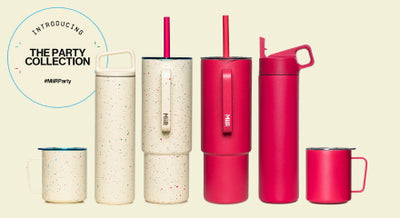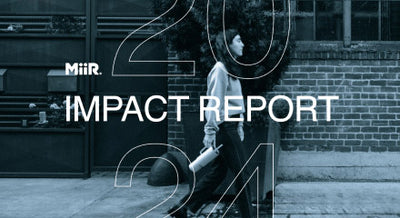
Responsibility
We recognize human-caused environmental degradation is a threat not only to healthy markets and healthy businesses, but most importantly to our quality of life.
As a result, we’re on a mission to fundamentally change how business operates – from sourcing to design to the well being of our people.
01 Supply Chain02 Products & Packaging03 End of Life04 Our Footprint

2024 Impact Report
From carbon reductions to community investments, our 2024 Impact Report shares how your purchase supports people and the planet.
Explore the progress we’re making—and where we’re headed next.
Read the Report2024 Highlight
In 2024, MiiR surpassed
$5 million in lifetime giving
Being a consumer goods company, we have an inherent impact on the planet.
With this in mind, we refrain from referring to anything we do as inherently “sustainable.” Instead, we’re committed to a responsible business model - one that puts an emphasis on continuous learning and evolution of process, all in the name of reducing our negative environmental impacts.
Our responsibility efforts are guided by the following commitments:
Measure & Manage
We commit to continuously improving upon the measurement and management of our environmental impacts.
Minimize Impact
We commit to minimizing the impact of our materials, manufacturing, and distribution.
Maximize Product Lifespan
We commit to maximizing product lifespans, reusability and recyclability.
01
Supply Chain
Fair Labor & Environmental Responsibility
At MiiR, it is pivotal that our suppliers uphold the highest standards of social and environmental compliance. To ensure these standards, we have a dedicated team based in the same cities as our suppliers to help enforce our code of conduct. Additionally, we regularly perform third-party audits to ensure that all practices are conducted responsibly. Click here for detailed information on where our supply chain partners are located, our selection process, our code of conduct, and more.
Logistics & Distribution
In 2019, we opened a logistics hub in Asia to more rapidly serve our customers around the globe. This significantly reduced the freight emissions from shipping goods to the US and then back around the globe to our customers. Through enhanced planning and processes, along with support from our freight forwarders and U.S. distribution center team, we have reduced the environmental impact of shipping goods worldwide and continue to assess and minimize our reliance on high-emission transportation methods.

02
Products & Packaging
Our product development team is dedicated to creating products in the most responsible way possible, taking into account the following elements:
Durability
The most sustainable product is the one that already exists, so we engineer our products to stay in play as long as possible.
Replaceability
We understand that accidents happen, so we aim to design all of our products with replaceable parts. If something breaks, we want to be able to fix it, issuing you a replacement part instead of having to replace the entire product.
Recyclability
If a product reaches the end of its useful life, we want to ensure it doesn’t end up in a landfill. We use commercially recyclable materials to enable the creation of new products from old ones. Recognizing not everyone has access to commercial recycling systems, we designed our Re:Claimed program so you (the customer) can help us recycle these products responsibly.

Materials
We carefully select the materials used in our products to uphold the design standards outlined above. Below are some of the most commonly used materials across our product lines and their specific applications.
Packaging
Our packaging uses FSC Certified materials and all of our bulk boxes are 90% post-consumer recycled cardboard. Every Kraft hang-tag, product backer card, and box is made with the most sustainable materials available and they’re recyclable.
We’ve joined PrAna’s Responsible Packaging Movement and are committing to eliminate single-use plastic and virgin forest fiber from our packaging, as well as excess packaging waste in our supply chain. We’re inviting fellow brands and our community to adopt goals and join us in our journey to #ReshapePackaging

03
End of Life
Re:Claimed
In 2022, we launched our first Re:Claimed program, the Re:Claimed LTO. Since then, our end of life solutions, AKA “Re:Claimed” have grown and morphed into two distinct programs:

Recycle responsibly with our Take-Back Program
Our stainless steel products are designed to last generations. Sometimes, though, life happens. Whether your MiiR is dented and dinged or your style has changed, recycle responsibly with us through our Re:Claimed take-back program.
Learn More
Limited edition prints on perfectly good products
Sometimes mistakes happen to perfectly good products. Misprints, an upside-down logo, a fleck of ink out of place. From our printing partners to our customers, we’re all sticklers for standards. And occasionally, less than .007% of the time, (yeah, not very often) that leaves a perfectly good product without a home. We take these never-before-used products, fix the cosmetic mistakes, and create something new. To keep up to date with the latest limited edition Re:Claimed products, click here.
04
Our Footprint
Measurement & Accountability
Measuring our carbon footprint gives us a clear target for improvement. Our footprint is measured on an annual basis with the help of Change Climate (formerly known as Climate Neutral). For the past five years, we’ve partnered with the Change Climate Project to manage our carbon impacts and achieve certification. To learn more about the Change Climate Project and The Climate Label, click here.
With the help of Change Climate, we:
Measure
We start by measuring emissions and assessing the carbon impacts of all of our products and services from cradle to customer. It all starts here: with a solid inventory of the carbon emissions from making and delivering our products and services. Measurements include Scopes 1, 2, and upstream Scope 3 emissions (per the Greenhouse Gas Protocol).
Fund
To obtain the Change Climate label, a price on carbon is applied, and MiiR’s “Climate Transition Budget” is developed. MiiR is responsible for spending that budget on value chain abatement efforts, and making our contribution to global net-zero GHG emissions by purchasing eligible verified carbon and clean energy credits that support climate projects outside our value chain.
Reduce
Once we’ve identified our “hot spots,” and established a climate transition budget for the year, we work to reduce value chain carbon emissions, and annually document plans and progress toward emissions reductions. We work with the Change Climate team to develop and implement reduction action plans (RAPs) that chart goals over a period of 12-24 months.

Our 2024 Footprint
Read our 2024 impact report for more details.
Measurement
In 2024, our carbon footprint decreased from 9,529 tCO₂e to 5,603 tCO₂e - a 41.2% reduction in overall emissions. This progress was driven primarily by transitioning from virgin stainless steel to recycled stainless steel across our product line. Materials and manufacturing continue to represent the largest share of our footprint (about 83%), with stainless steel alone accounting for 53% of total emissions in 2023. By shifting to recycled stainless steel this year, we reduced stainless-steel-related emissions by 72.5% and achieved a 41% reduction in overall emissions - a major step forward!
Reduction Goals
Looking ahead, our priority is to transition more of our plastic components (such as lids) to lower-impact, recycled alternatives. We’ll also continue advancing waste-reduction initiatives in our factories as well as in our domestic print and distribution centers. Read more about our emissions reduction goals by visiting our Change Climate profile.

Investments in Carbon Reduction
This year, we applied a fee for every tonne of carbon emitted, forming the basis of our climate transition budget. We used this budget to invest in carbon reduction projects both within and beyond our value chain
In 2024, we invested:
- $60,962 into Value Chain Abatement projects (like transitioning to recycling materials) that reduce GHG emissions within MiiR’s supply chain and operations.
- $12,607 into other projects (like a drinkware decarbonization co-lab with other OIA members) that support capacity building and system change to accelerate the climate transition.
- $10,691 into projects beyond our value chain (like investments in carbon offsets, removals, and renewable energy credits) that remove or avoid GHG emissions.
Learn More
Explore our emissions progress over time and the full suite of carbon-reduction projects we’re investing in by visiting our profile on Change Climate’s website.
If you’re interested in the full suite of certifications and alliances that empower MiiR to do this work, click here.




















